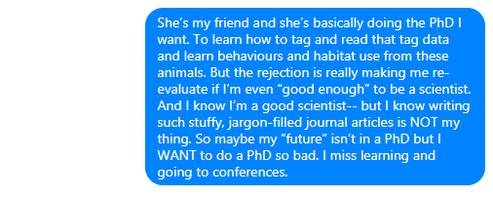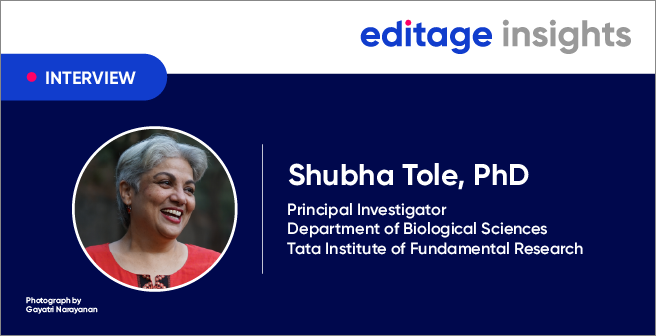Why I am questioning pursuing a PhD

Ever since I could remember, the ‘running joke’ in my family was that I would be the first to get their doctorate of Philosophy (PhD). It’s a ‘joke’ because my grandfather would rib my mother’s side in that she didn’t complete hers.
And that drove me through the hard Calculus classes, the impossible Organic Chemistry (I failed the first time around), and the super hard year of MSc. When people asked me what I was doing with my life, I would proudly say I was hoping to get my PhD in Marine Biology. All the marine biology jobs I was interested in said, “PhD required, PhD required, PhD required, PhD required, MS required, PhD required.” I got the point. “A PhD is a basic requirement for a career in academia.” A statement of truth — and I listened to that for a while, until I declared I did not want a career in just academia (no offense to those who have decided to pursue that path). So then another statement popped into my head to replace the old mantra: “A PhD is what makes you a scientist.”
That statement started feeling wrong as my science communication took off after my TEDx talk (read about my TEDx experience here) and even before then when I was doing it with The Fins United Initiative and seeing it all around me. I was still a scientist, just not in the traditional sense of a white lab coat, goggles, and scalpel. And it was the mantra that punched me across the face when I got the result of my first article publication put up for review: rejection.
“I am not confident that the author understands the context of the material or has thoroughly reviewed the subject at hand.”
Heck, it wasn’t even a rejection — it was a complete beat down of THREE YEARS of work I completed. What I think hurt more was the fact that I had numerous people go through this article with me (because I essentially went at it alone) and not one said anything to this degree.
I was already feeling pretty crummy (recovering from a crocodile bite, on heavy medication, etc.) and this literally felt like a slap across my face. I’ll admit it, I cried. Some of it was probably from the nerves over what had happened recently (the bite had taken place four days before) but also because I was relying on this article to get published.
One, so I could finally put my MSc behind me and be done with that topic so I could move on to other things that interested me (like telemetry – shark movements). But two, I really, really, really want to stay in Australia longer than the year-long working holiday visa allows my husband and I to stay. We love it here. We love the people, the scenery, the weather, the animals, the… I could go on! You can ask any family member or close friend, I have been dreaming of living here and studying in Australia since I was a child. Trying to get in as an international student is hard, especially when international fees are outrageous. My best bet was to get a scholarship… and to get a scholarship you needed a paper published.
“But what if I’ve done x, y, z, and am even a part of a! That’s HUGE!” I countered. At this point, I had been trying to get a paper published for 8 months with little to no word from the person who was supposed to help me. “I’ve seen students with better achievements than that miss out on a scholarship because they didn’t have a publication,” is essentially what I was told. A publication was needed.
So getting that rejection, knowing full well all of this, and already exhausted and emotional from the trauma I recently dealt with, I fell into a rabbit hole of despair. I had alternating nightmares between screaming underwater in the dark and living on the streets because I just wasn’t good enough as a scientist. Dramatic, I know. But medications also make you… well, not yourself.
Hundreds of thousands of students embark on a PhD every year… and I’m truly wondering if I ever will be one of them. When you are at the bottom of a rabbit hole (and your activities are limited due to an injury), you have a lot of time to think. “I just don’t know if I’m a good enough scientist – clearly I’m not! I dedicated almost three years to this topic and I messed that up royally.” I reached out to some friends, told them about the rejection, and how I was feeling. I talked to my parents over breakfast cereal as I had meager spoonfuls of Frosted Flakes.
And one morning (or afternoon… the days are kind of blurry), my dad asked, “Why do you want a PhD? Is starting a doctorate degree motivated by love for knowledge or something else?”
I thought about it for a while. I didn’t want to regurgitate the whole “A PhD is what makes you a scientist” spiel I had given myself because… well, I just didn’t. And it amazes me that this one rejection (there were two reviewers and while both said similar things, one said it in a way nicer and more constructive manner than the other) had me rethinking my whole life path trajectory. Was I a good scientist but not a good enough scientist to get even a chance at a PhD?
Which then led to me thinking: Do I even want a PhD? Gasp, I know! I can imagine my abuelo clutching his chest now. But this hazy, medicated state made me wonder if I wanted a PhD for the right reasons or because it was just “expected” of me (see the beginning of this post). So I said I wanted a PhD to continue to pursue my relentless curiosity about these animals (sharks and their relatives) at a level I could help control and that I loved intellectual pursuits. It wasn’t put as eloquently as that, but you get my drift. And I find researching new and exciting subjects irresistible, it’s true! My dad then asked, “Do you need to have a PhD to pursue your scientific endeavors?”
Here are some reasons why PhD’s aren’t for everybody…
You don’t need it for your field
This is kind of a no-brainer. Not every job one is after will say “Must need a PhD.” So why get one if you don’t need it?
You go another avenue… like being an entrepeneur
Scientists are born innovators (or creators) which makes them great entrepreneurs. If you think about it, we are basically trained to look at the “gaps” in the world and find a way to fill them in – use that to your advantage! Many even take a few extra classes at your university or through something as simple as Coursera to get your bearings on x that you want to pursue (such as business classes).
The costs just seem too high (and I’m not talking financially)
I have seen too many people be miserable the entire time they are doing their PhD due to the stress that comes with it. Many people are just turned off by this overly high cost—bad health problems, the strain on relationships, the outrageous deadlines, constantly moving, tremendous stress, huge debts, loss of a 401(k) or other assets.
Finances – the big $$$ decision kind
While doing a PhD is intellectually rewarding, it isn’t financially rewarding (at least not short term). Most PhD students live on meager earnings from being a TA and research assistant, others have a part-time job, and some live off of a stipend. I hated my “starving student days,” and am not exactly keen to go back… I particularly enjoy my salary which allows me to not only pay my bills but also to save some money for a rainy day and pad my retirement fund. These were luxuries I did not have as a student in a low-paying part-time job.
One of the big “pet peeves” I have with academia is that I have never seen a course or group at a university that helps graduate students with best managing their money during these frugal times. For graduate students with sufficient stipends, investing during graduate school is a great financial goal. But often times, stipends cover just the bare necessities (if that) and students investing money for retirement or an emergency fund is rarely heard of. Many people say “no thanks” to a PhD due to the high cost (of not only money but time) and the low short-term return (i.e. low stipend or debt).
So do I want a PhD? Do I need a PhD? Well, I sent this to a friend over Facebook (again, not eloquently put but we went into more detail with what I mean in following texts):
You can make of that what you will. Bottom line is I miss being a part of the conversation of cutting edge technology, innovation, and research. I’ve been working office administration jobs that, while they pay well, aren’t doing much to stimulate my brain (in fact, I fear I’ve lost all of my R-programming knowledge). I don’t really care how I get back into that ‘action’ – be it through a PhD or job. I will say that the things I am passionate about are, more and more, issues that I feel are best addressed in a non-academic job. But I believe a PhD will help me reach my ‘end goals’ better than not having one.
Going through all of this with my parents and friends, my dad gently reminded me that I was young and could do a PhD whenever – it didn’t have to be this year. That is something I hold onto when the thought of failure feels like walls closing in rapidly around me.
I wish I could tell you I have everything sorted out, but I don’t. I’m almost halfway through my working holiday visa and no closer to pursuing a PhD or any other visa avenue to allow us to stay longer in a place we love dearly. I don’t know what our “next steps” will be. Some advice I’ve learned in this process, though…
- Don’t forget just how much you’re capable of, especially when you run into walls. Everyone has a ceiling, and success is learning how to manage yours when you hit your head on it.
- Evaluate why you want to pursue things. Will it move you forward? Take time to think critically about your intentions.
- Stop chasing the “normal path” and open yourself up to the many opportunities for learning and connecting that are happening all around you.
- Don’t assume that failing to obtain a PhD is the worst thing that could happen. Perspective, my friends.
As for that rejected publication? I think I’m finally ready to look at it again with clearer eyes and a notebook to jot down a plan.
Melissa Cristina Márquez (@mcmsharksxx) is the Founder of the The Fins United Initiative. This story was published on May 10, 2018, on Melissa’s blog
(available here) and has been republished here with her permission.





